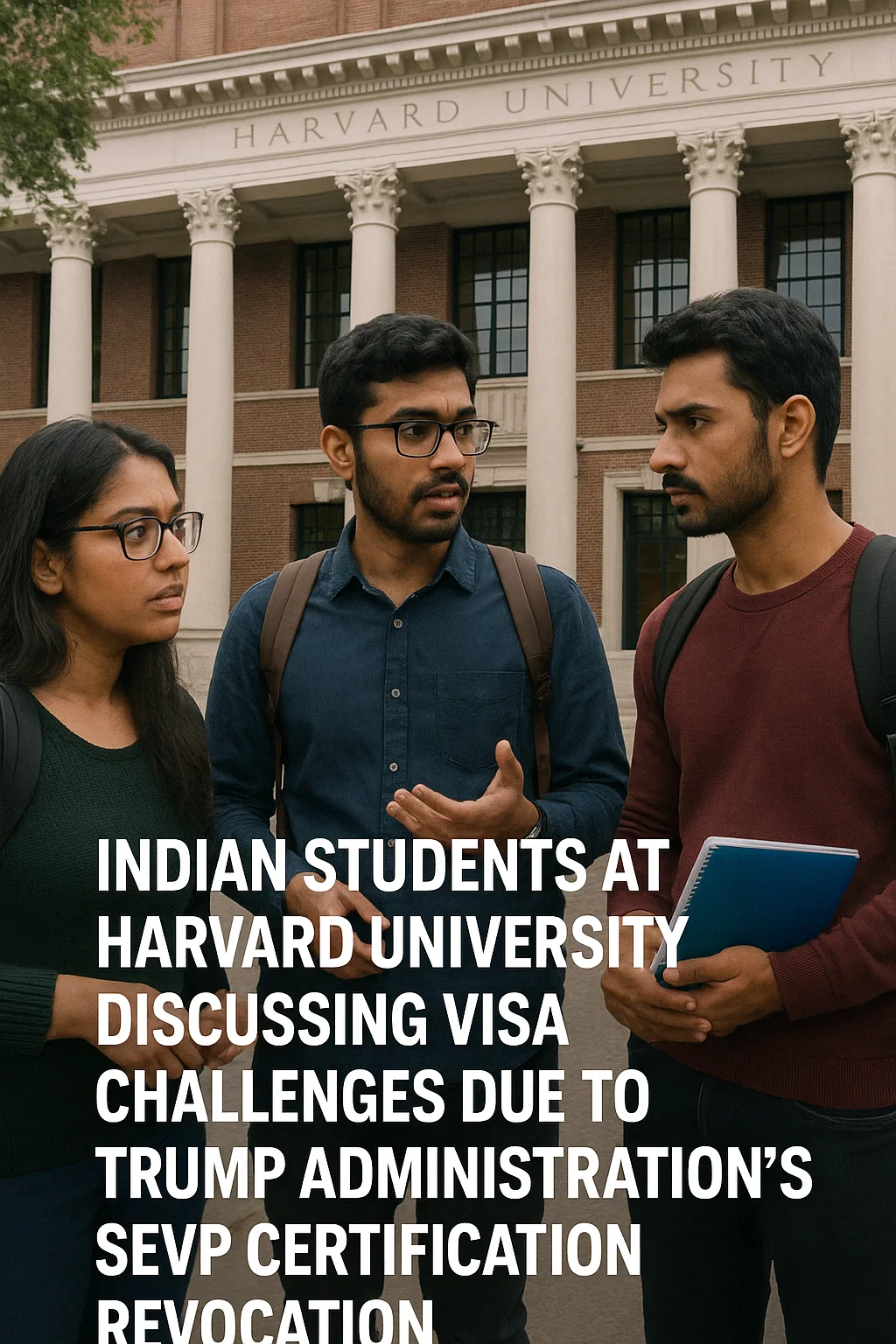Subtotal $0.00
What Happened?
On May 22, 2025, the U.S. government, led by President Donald Trump’s team, made a shocking decision. They canceled Harvard University’s permission to enroll international students under a program called the Student and Exchange Visitor Program (SEVP). This program allows foreign students to study in the U.S. on special visas like F-1, M-1, or J-1. Without this permission, Harvard cannot accept new international students starting from the 2025-26 academic year. Current students, including 788 from India, must either transfer to another U.S. school that has SEVP approval or leave the country.
Why Did This Happen?
The U.S. Department of Homeland Security (DHS), led by Kristi Noem, said Harvard was not following rules. They accused the university of:
- Supporting violence and antisemitism (hatred toward Jewish people).
- Working with the Chinese Communist Party.
- Not sharing records about foreign students, like videos or audio of their protest activities.
The government also criticized Harvard’s policies on diversity, equity, and inclusion (DEI), which aim to make the campus fair for everyone. They claimed Harvard supports groups that favor Hamas, a controversial organization. Harvard strongly disagrees, calling the decision “illegal” and “unfair.” The university says it’s fighting back in court, and a judge has given temporary relief to delay the impact on students.
Who Is Affected?
Harvard has about 6,800 international students, making up 27% of its total students. Out of these, 788 are from India. Indian students are a big part of Harvard’s community, with 500–800 joining every year. Many study high-demand fields like science, technology, engineering, and math (STEM). This decision affects their education, visas, and future plans.
What Does This Mean for Indian Students?
1. Transferring to Another School
Indian students at Harvard now face a tough choice. They must find another U.S. school that is SEVP-certified to continue their studies legally. Some top options include:
- MIT (Massachusetts Institute of Technology)
- Stanford University
- Yale University or other Ivy League schools
However, transferring is not easy. Most schools have already finished admissions for the year, and spots are limited. Plus, getting scholarships or financial aid can be hard. Students may need to act fast to secure a new school before their visa status expires.
2. Risk of Losing Visa Status
If students cannot find a new school, they may lose their legal status in the U.S. This means they could be forced to leave the country or face deportation. This is a big worry for Indian students who have spent a lot of money and effort to study at Harvard.
3. Disruption to Studies
Harvard is one of the world’s top universities, ranked 4th in the QS World University Rankings 2025. Many Indian students choose it for its excellent programs and opportunities. Transferring to another school could delay their graduation, affect their research, or weaken their career networks.
4. Financial and Emotional Stress
Studying at Harvard is expensive, especially for international students who pay higher fees. If students have to leave or transfer, they may lose money on tuition, housing, or travel. The sudden news has also caused stress and worry for students and their families back in India.
Why Is This a Big Deal?
For Indian Students
India sends thousands of students to the U.S. every year, and Harvard is a dream destination for many. This decision could make it harder for Indian students to trust U.S. education. If they can’t stay at Harvard, they might consider schools in Canada, the UK, or Australia instead, which are known for welcoming international students.
For Harvard University
International students, including Indians, bring in a lot of money for Harvard. They also make the campus diverse and help with important research, especially in STEM fields. Losing these students could hurt Harvard’s budget and reputation as a global leader in education.
For U.S.-India Relations
This move comes at a time when President Trump has talked about trade deals with India, some of which India’s government has denied. Blocking Indian students from studying at Harvard could strain ties between the two countries, especially in education and innovation.
What Can Indian Students Do?
Here are some steps Indian students at Harvard can take:
- Contact Harvard’s International Office: The university is likely helping students with transfer options and visa advice. Reach out for guidance.
- Look for SEVP-Certified Schools: Start applying to other U.S. universities as soon as possible. Check schools with strong programs in your field.
- Talk to an Immigration Lawyer: An expert can help with visa issues or explore ways to stay legally in the U.S.
- Consider Other Countries: If staying in the U.S. is too hard, look at universities in Canada (like the University of Toronto), the UK (like Oxford or Cambridge), or Australia.
- Stay Updated: Harvard is fighting the decision in court. Follow news updates to see if the situation changes.
What’s Next for Harvard?
Harvard is not giving up. The university says it will challenge the government’s decision in court, arguing that it’s unfair and against academic freedom. A judge has already given temporary relief, which means students might have more time to plan. However, the Trump administration has warned that other universities could face similar actions if they don’t follow orders.
Why This Matters to Everyone
The clash between Trump and Harvard is more than just a fight over one university. It could change how international students, especially from India, view studying in the U.S. If more schools lose SEVP status, fewer students might choose the U.S., which could hurt its economy and innovation. International students contribute billions of dollars and bring fresh ideas to fields like technology, medicine, and business.
Final Thoughts
The situation at Harvard is a tough time for 788 Indian students and thousands of others. They face big decisions about their education and future. By acting quickly, seeking help, and exploring options, students can find a way forward. Meanwhile, Harvard’s legal fight could decide whether this ban stays or goes. For now, Indian students, parents, and education enthusiasts should stay informed and prepared for what comes next.












